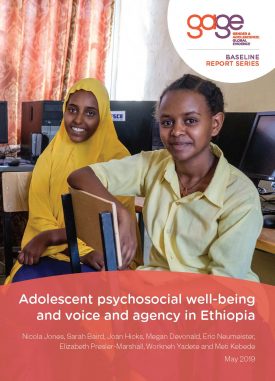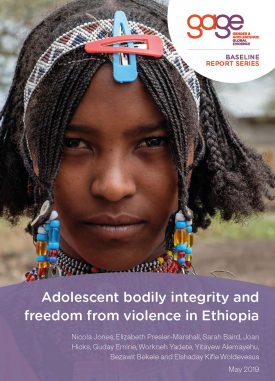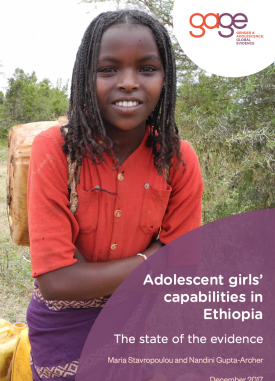Globally, more than 650 million women are married before their 18th birthday (UNICEF, 2018). Although the practice of child marriage has decreased substantially over the past 20 years, it remains strikingly pervasive in some regions of the world, particularly South Asia and Sub-Saharan Africa where up to 50–70 percent of girls in some countries are married prior to age 18 (UNICEF, 2014). Data from sub-Saharan Africa shows that the prevalence of child marriage is declining, though significant variations across and within countries exist (UNICEF, 2018). In Ethiopia, 63 percent of girls are married by age 18, and the custom of child marriage remains a deeply rooted tradition with a multitude of harmful consequences (CSA & ICF, 2016).
Marrying early has severe repercussions across several domains. Child marriage heightens girls’ social and economic insecurities, threatens their physical and psychological health and limits their ability to exercise their rights. The negative health consequences of child marriage have been broadly documented and include early pregnancy and social isolation, greater likelihood of school dropout, lower labor force participation and earnings, limited decision-making power in households and increased risk for domestic violence (Parsons et al, 2015). Socio-culturally rooted gender inequalities are further compounded by power differentials due to age disparities within these relationships, thereby limiting girls’ agency (Choi and Ha, 2011; Fleming, White and Catalano, 2010). Moreover, gender inequalities within child marriage unions reinforce girls’ vulnerabilities by increasing their risk of experiencing intimate partner violence (IPV) (Erulkar, 2013).
Despite widespread knowledge of the negative implications of child marriage on girls’ overall well-being, there is a dearth of information on the impact of child marriage on mental health and the mechanisms that influence it. Given these gaps, this brief explores the relationship between child marriage and mental health, assesses if IPV mediates this relationship and provides recommendations for future research and programming.
Suggested citation
Sebany, M., Kapungu, C. and John, N. (2019) ‘Child marriage, intimate partner violence & mental health among young Ethiopian women: a research & programmatic brief.’ Washington DC: International Center for Research on Women. (https://www.gage.odi.org/publication/child-marriage-intimate-partner-violence-and-mental-health-among-young-ethiopian-women/)


